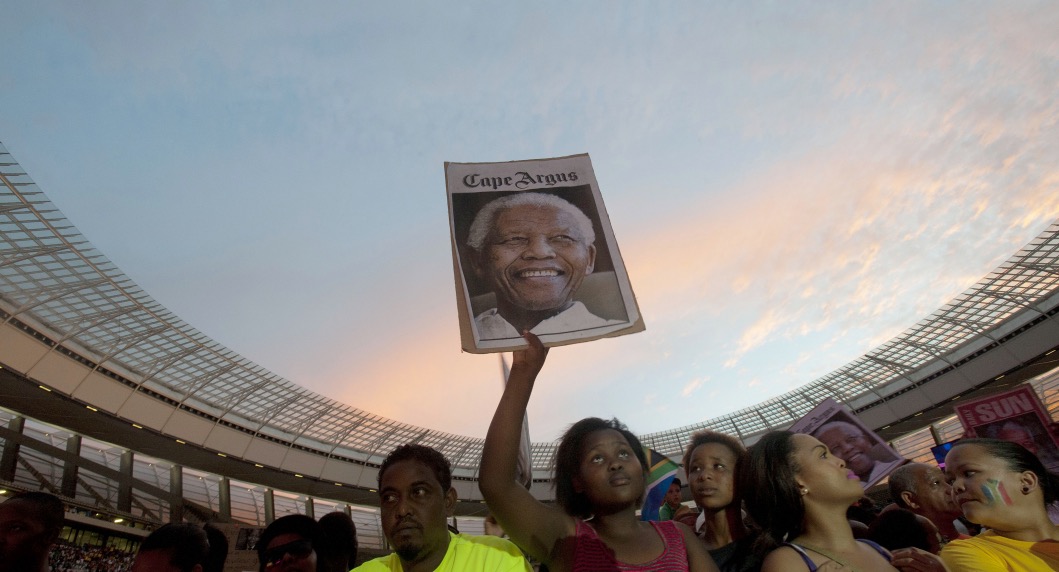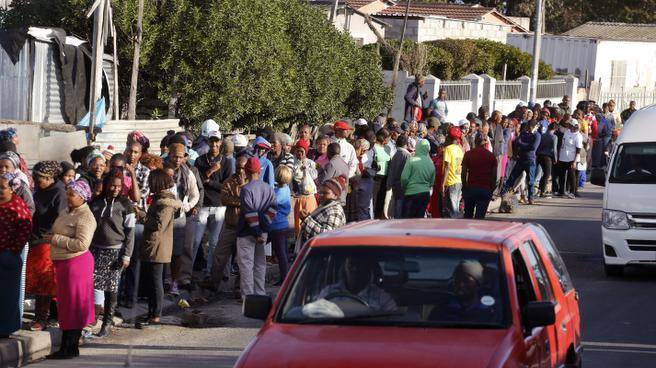
AFP / RODGER BOSCH (Photo credit should read RODGER BOSCH/AFP/Getty Images)
JOHANNESBURG — The unlikely new face of South African politics is white, and he speaks in the emphatic clicks of the Xhosa language.
Bullish and beaming, Athol Trollip, the presumptive mayor of Nelson Mandela Bay, South Africa’s sixth-largest metropolitan area, addressed a cheering crowd of supporters on Aug. 6. “When the winds of change start blowing in this country, as they did on Wednesday, they are unstoppable,” Trollip declared, switching easily between English and Xhosa, a Bantu language spoken mainly by black South Africans in the Eastern Cape region.
Trollip’s likely victory — his election won’t be certain until the parties have formed a coalition — was seen as an embarrassing defeat for the party of his city’s namesake. In last week’s local government elections, a record number of voters ditched Nelson Mandela’s party, the African National Congress (ANC), which has been in power since the first post-apartheid elections in 1994, and cast their ballots for the opposition. In addition to black-majority Nelson Mandela Bay, the ANC also lost control of Pretoria, the nation’s capital. Nationwide, it saw its share of the vote slide to 54 percent, down from 62 percent in the 2011 local elections.
But there is an irony in the bad fortune of Mandela’s party — it could hasten the realization, however slowly and imperfectly, of Mandela’s vision of a multicultural “rainbow nation.” Not only did an important majority-black city elect a white mayor in Trollip, but his party, the liberal Democratic Alliance (DA), has gradually begun to shed its image as a party for whites. Last year, the DA elected Mmusi Maimane, a 36-year-old part-time preacher who grew up in the Johannesburg township of Soweto, as its first black leader.
Susan Booysen, a politics professor at the University of the Witwatersrand in Johannesburg, described the election as the dawn of a “a new era” in South African politics. “It came with a big electoral bang,” she said.

Since the end of apartheid, politics in South Africa have been conducted largely along racial lines. The black majority has voted overwhelmingly for the ANC in every election while whites and other minorities have mainly voted for smaller parties like the DA.
During this year’s often nasty campaign, the ANC relied heavily on rhetoric intended to foment racial division. President Jacob Zuma, whose time in office has been marred by one scandal after another, warned that the DA would bring back apartheid while accusing Maimane of being a puppet of the white minority. In late July, at a campaign rally in Nelson Mandela Bay, he accused the DA of being “snakes” and the “spawn” of the racist National Party that ruled during apartheid. (In fact, the DA was born in 1959 of a complex set of mergers with parties that were both progressive and not.)
The ANC also accused Trollip of being a racist, and claimed that his family had abused black workers at their Eastern Cape farm. Trollip has strongly refuted the allegations, calling them a “pack of lies.”
But if the ANC overreached with some of its attacks, it was attempting to exploit a reputation for racial insensitivity on the part of the DA that is very real. Although most DA supporters aren’t racists, the party has long attracted a crusty, bigoted fringe whose social media presence has become a liability. In one particularly damaging incident earlier this year, a DA member named Penny Sparrow was expelled from the party after complaining on Facebook about the mess black “monkeys” had left on beaches in the coastal city of Durban.
This checkered past no doubt helps to explain why the DA has historically struggled to appeal to black voters: While South Africa is 80 percent black, the DA received only 6 percent of the black vote in the 2014 general election. But since then, the party has tried hard to diversify — not just by electing a black leader but by focusing outreach efforts on formerly ANC-dominant areas. Controversially, the DA has made the case that it, not the ANC, is the true political descendant of Mandela.
Controversially, the DA has made the case that it, not the ANC, is the true political descendant of Mandela.
“There is only one party in South Africa today that truly represents the values and vision that Madiba lived out,” Maimane said on the eve of the election, using Mandela’s Xhosa clan name, which is a term of respect in South Africa. “That party is the Democratic Alliance.”
This message may have helped the party broaden its appeal ahead of the vote, but the decisive factor in this election seems to have been the ANC’s own record of failure. Not only has the party of Mandela disappointed many voters with its spotty provision of basic services like electricity and water, especially in rural areas and poor townships, it has presided over a deteriorating economy marked by worsening unemployment and frequent corruption scandals.
South Africa’s economy is expected to grow just 0.1 percent this year, while unemployment sits at a staggering 36 percent when those who have simply given up looking for work are taken into account.
Frans Cronje, the CEO of the Johannesburg-based Institute of Race Relations, said the election hardly marked “a revolutionary swing to the liberal opposition.” On the contrary, he said, it was a referendum on jobs and the economy — areas where the ANC has clearly failed.
“Every poll we have seen or done for years reveals that the issue South Africans want the government to address most is jobs,” said Cronje. “This has not been done, and the government’s policies remain hostile to growth, investment, and job creation.”
Still, the DA’s unexpected victories in Pretoria and Nelson Mandela Bay — as well as its impressive gains in Johannesburg, where depending on the outcome of coalition negotiations, it could end up leading the government — underscored the newfound willingness of South African voters to look beyond race when electing their political leaders.
“The race-baiting and populist rhetoric of the ANC failed badly in this election,” said Cronje.
Younger voters in particular seemed immune to the ANC’s racially-tinged criticism of the DA, something that has resonated with the voters in in the past.
“They are prepared to overlook that, and just see the emerging DA,” Booysen of the University of the Witwatersrand said of younger voters.
“For long, we were slowly inching towards being a proper, lively, multi-party system that holds power to account,” the South African author and political commentator Justice Malala wrote in a column this week. “We are now hurtling that way. It’s exhilarating.”

Leave a Reply